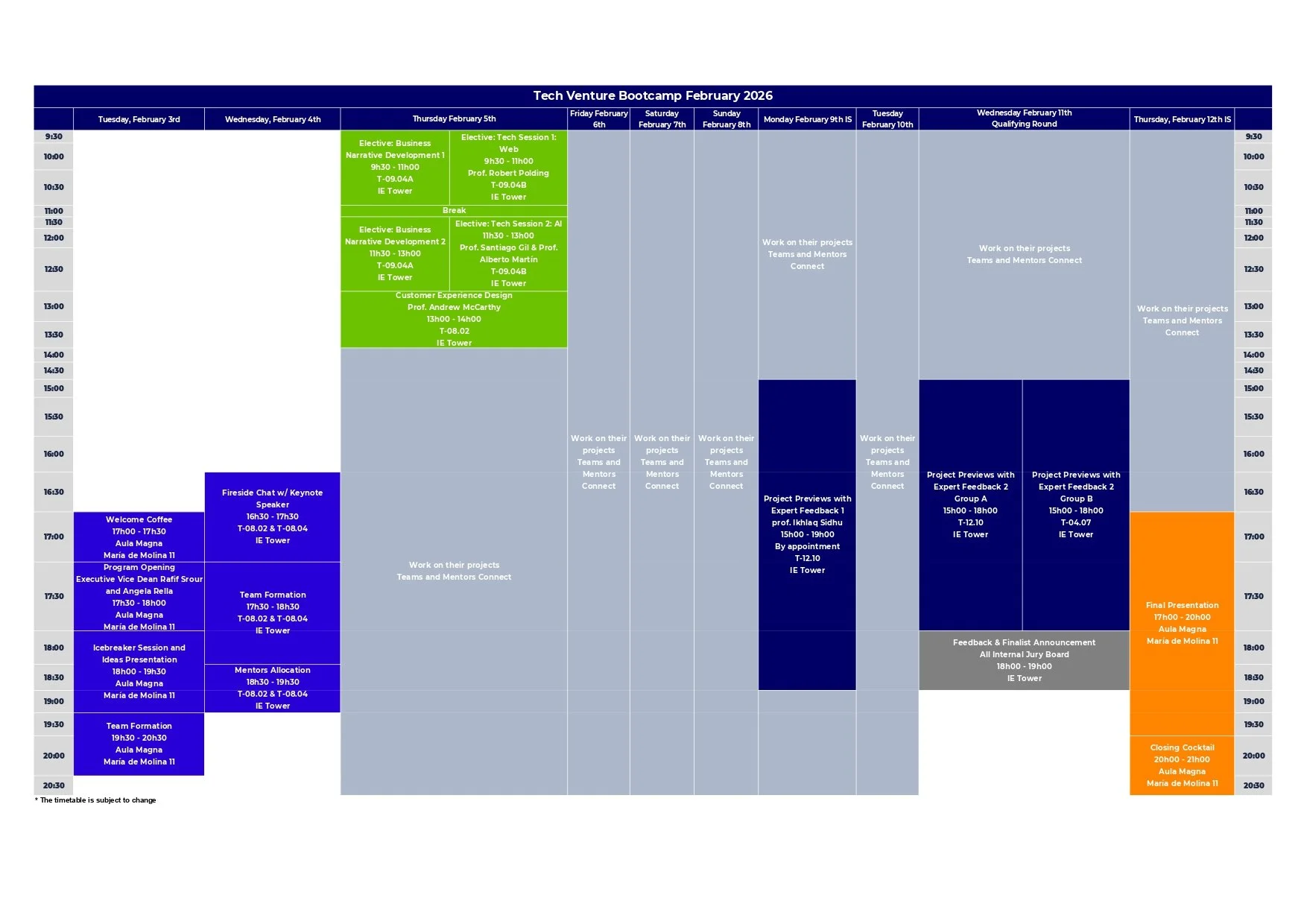Agenda
Explore the agenda and detailed descriptions of each session.
February 3rd
Maria de Molina 11
Aula Magna
17h00 - 17h30
17h30 - 18h00
Welcome Coffee
Warm welcome with coffee and light refreshments while completing registration.
Program Opening and Program Information
The event will begin with opening remarks from the Executive Vice Dean Rafif Srour. Following this, Angela Rella, Program Coordinator, will deliver a detailed overview of the program, walking students through the agenda and key activities planned for each day.
February 4th
Floor 8, classroom T-08.02
IE Tower
16h30 - 17h30
17h30 - 18h30
18h30 - 19h30
February 5th
Floor 9, classroom T-09.04A & T-09.04B
IE Tower
09h30 - 13h00
09h30 - 13h00
Customer Experience Design
TBD
February 11th
Floor 12, workroom T-12.10
Floor 4, workroom T-04.07
IE Tower
February 9th
Floor 12, workroom
T-12.10
IE Tower
By appointment
15h00 - 19h00
By appointment
15h00 - 18h00
February 12th
Aula Magna, Maria de Molina 11
17h00 - 20h00
20h00 - 21h00
Team Formation
This session provides students with additional time to elaborate on their ideas, refine their concepts, and connect with potential teammates. Through interactive discussions and networking, students will explore collaborations and form diverse, balanced teams to bring their ideas to life.
Business Narrative Development
This session helps students craft a compelling story around their project by refining their value proposition, clarifying their problem-solution fit, and structuring their pitch. The focus is on developing a clear, engaging narrative that effectively communicates their idea’s impact and potential.
Projects Previews with Expert Feedback 1
In this session, teams will present their technical solution only, focusing on:
What you built
How it works
Technical feasibility and execution
All teams are required to present during this session, although at least one team member must be present.
An internal jury and mentors will provide detailed feedback during the pitch to help you improve both your technical solution and your business reasoning. Business feedback is advisory only and not part of the evaluation.
Projects Previews and Feedback 2
This session serves as the Qualifying Round for the Final.
Teams will again present only their technical work, including the prototype and technical approach.
All teams are required to present, with at least one team member present.
An internal jury and mentors will provide detailed feedback on both technical and business aspects. However, assessment in this session is based exclusively on technical criteria.
By the end of this day, the teams selected to advance to the Final will be announced via email.
Final Presentation
The selected teams will have the opportunity to present their full projects in a 5-minute presentation. This will be followed by a 5-minute Q&A with the External Jury. After deliberation, the jury will announce the three winning teams.
Closing Cocktail
The closing cocktail offers an opportunity for students, mentors, and guests to celebrate the completion of the program.
18h00 - 20h30
13h00 - 14h00
Icebreaker Session and Ideas Presentation & Team Formation
Students will be able to build connections from the start. In this session, students who have a project idea will deliver an elevator pitch focusing on the problem they aim to solve and their proposed solution. While presenting an idea is optional, this is a great opportunity to share concepts, find potential teammates, and refine ideas for further development
Fireside Chat with a Keynote Speaker
A conversation with a keynote speaker on ideation and what makes a great idea. The discussion will cover key elements of strong ideas, practical guidelines, and insights from the speaker’s entrepreneurial journey, including major challenges and lessons learned. The goal is to inspire students to think big and develop impactful solutions.
Mentors Allocation
Mentors will have the opportunity to select the teams they will mentor based on their expertise and the project’s needs. This ensures a strong alignment between mentors and teams, providing tailored guidance, insights, and support throughout the program.
Tech Session: Web & AI
Web: This session covers the essentials of full-stack web development, focusing on back-end architecture and a brief overview of front-end components. Professor Robert Polding will provide valuable insights into back-end systems and workflows, helping students build a strong foundation. The session will also explore practical ways to connect back-end and front-end architectures effectively.
AI: This session explores the practical application of AI in development, focusing on deploying AI models within a PythonAnywhere backend using the OpenAI API. We will expand the baseline code with a primer to incorporate AI functionalities such as voice-to-text, and image and video interpretation and creation, concluding with a bonus segment on prompt engineering.
Attendance Policy
Review the attendance waiver policy for the program sessions here.
Final Project Presentations
General Guidelines






